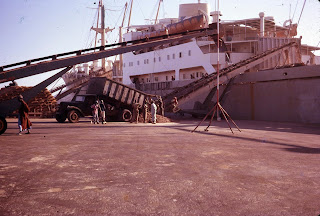Dad had been offered a very good job back in England with the company he worked for, so we booked a passage by sea back to the UK. We had travelled out in 1960 on a small passenger liner called the Thysville, but our return was to be on an even smaller tramp steamer, the SS Vikaren, which only had 6 passenger cabins, being primarily a freight ship. Tramp steamers are so called as they do not have a fixed schedule, though this one plied the route between Holland and Angola, but varied the stopping ports depending on the cargo.
 |
| The SS Vikaren at anchor |
The main cargo was some kind of animal feed destined for Freetown, in Sierra Leone, but we did stop off at some other places on the way to unload cargo, and our first destination was São Tomé, a small Portuguese island off the coast of Gabon.
 |
| The ship anchored offshore |
Being a Portuguese territory we had no problems with language and booked a taxi to take us a short tour of the island.
 |
| Central São Tomé, I think |
 |
| Washing day |
 |
| Waterfall on the island - taxi guide on the right! |
 |
| Unloading in Freetown, and loading a new cargo |
 |
| Berthed in Freetown |
 |
| Drop net fishing in Freetown |
I had my 10th birthday on board, which I thought would be a very quiet affair as we were the only passengers, but we had a small party thrown by the officers and I received a few gifts, the only one I recall being a stamp catalogue (the Swedish equivalent of Stanley Gibbons!) by the Radio Officer (Sparky!), who was also a stamp collector and we had spent some pleasant hours discussing our collections! It was obviously in Swedish, which I didn't understand, but had a lot of detail about what to look for in "rarer" stamps (missing watermarks or perforations, design not straight, etc.) so was very useful.
Our next - and final stop before Rotterdam - was Dakar, the capital of Senegal - where some more cargo was unloaded. We again anchored offshore and the cargo, and us, was ferried ashore.
 |
| Approaching Dakar |
 |
| Cargo being taken ashore by barge and tug |
 |
| Locals paddled out on canoes to sell produce |
 |
| More vessels, some with sails, unloading cargo |
 |
| Railway Station in Dakar |
We were given an African Grey Parrot, Jacko, while in Angola and he accompanied us on our journey home. We had to get all the paperwork sorted out prior to leaving, but as he was not leaving the ship until Rotterdam, and then just between the ship and the ferry across to the UK, we were informed that he needed nothing special, but would be quarantined upon arrival in the UK (I do not actually recall if this was the case then, but research implies it was!). We had a large wooden "cage" built with steel bars so he could see out, and he stayed in the same cabin as my sister and I. He was generally a fairly quiet bird, but a good talker, though my father was the only family member who could handle him, but feeding him was not a problem. He chewed his way out of the wooden cage, though, en route and that did become a problem, until the crew managed to make some running repairs!
One thing we hadn't realised though was that when we landed in Rotterdam we had to take a train to The Hague to catch the ferry, and this meant that Jacko was technically imported into Holland, so subject to their strict animal import laws! There followed a long discussion between my parents and the Dutch authorities, and eventually - as long as we kept him in a covered cage at all times - they allowed us to make the train journey to The Hague, where it was quite a rush to catch the ferry. We arrived back in the UK at the end of one of the worst winters on record, and after the warmth of Africa it was bitterly cold for us.
Our first African adventure had been an amazing experience for me, and was probably the start of my love for travel and foreign places.
(Footnote: I may have some of the photos incorrectly captioned - my father took all these on a 35mm slide camera, and I later scanned them all digitally, but most were not labelled, so I have had to try and remember - 55 years later - which belonged where, and, especially the "offshore" ones, may be wrong, but were definitely from that trip!)

No comments:
Post a Comment
Please feel free to leave your comments, however Spam or adverts will not be allowed. The blog is open to all so please minimise the use of improper language!